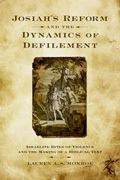
Josiah's reform and the dynamics of defilement: israelite rites of violence and the making of a biblical text
Monroe, Lauren A. S.
Lauren Monroe argues that the use of cultic and ritual language in the account of the Judean King Josiah's reforms in 2 Kings 22-23 is key to understanding the history of the text's composition, and illuminates the essential, interrelated processes of textual growth and identity construction in ancient Israel. Chapters 22 and 23 of 2 Kings tell the story of the religious reforms of theJudean King Josiah, who systematically destroyed the cult places and installations where his own people worshipped in order to purify Israelite religion and consolidate religious authority in the hands of the Jerusalem temple priests. This violent assertion of Israelite identity is portrayed as a pivotal moment in the development of monotheistic Judaism. Monroe argues that the use of cultic and rituallanguage in the account of the reform is key to understanding the history of the text's composition, and illuminates the essential, interrelated processes of textual growth and identity construction in ancient Israel. Until now, however, none of the scholarship on 2 Kings 22-23 has explicitly addressedthe ritual dimensions of the text. By attending to the specific acts of defilement attributed to Josiah as they resonate within the larger framework of Israelite ritual, Monroe's work illuminates aspects of the text's language and fundamental interests that have their closest parallels in the priestly legal corpus known as the Holiness Code (Leviticus 17-26), as well as in other priestly texts that describe methods of eliminating contamination. She argues that these priestly-holiness elementsreflect an early literary substratum that was generated close in time to the reign of Josiah, from within the same priestly circles that produced the Holiness Code. The priestly composition was reshaped in the hands of a post-Josianic, exilic or post-exilic Deuteronomistic historian who transformedhis source material to suit his own ideological interests. The account of Josiah's reform is thus imprinted with the cultural and religious attitudes of two different sets of authors. Teasing these apart reveals a dialogue on sacred space, sanctified violence and the nature of Israelite religion that was formative in the development not only of 2 Kings 23, but of the historical books ofthe Bible more broadly. Chapter 1: Destructive Rituals and the Creative Process: The Dynamics of Defilement in 2 Kings 23Chapter 2: Priestly Rites of Elimination and the Holiness: Core of 2 Kings 23:4-20Chapter 3: Herem Ideology and the Politics of Destruction: Josiah's Reform inDeuteronomistic PerspectiveChapter 4: The Mechanics of Transformation: The Holiness Substratum and Deuteronomistic Revision of 2 King 23:4-20Chapter 5: Literary, Historiographic and Historical Implications
- ISBN: 978-0-19-977416-6
- Editorial: Oxford University
- Encuadernacion: Cartoné
- Páginas: 216
- Fecha Publicación: 13/10/2011
- Nº Volúmenes: 1
- Idioma: Inglés
